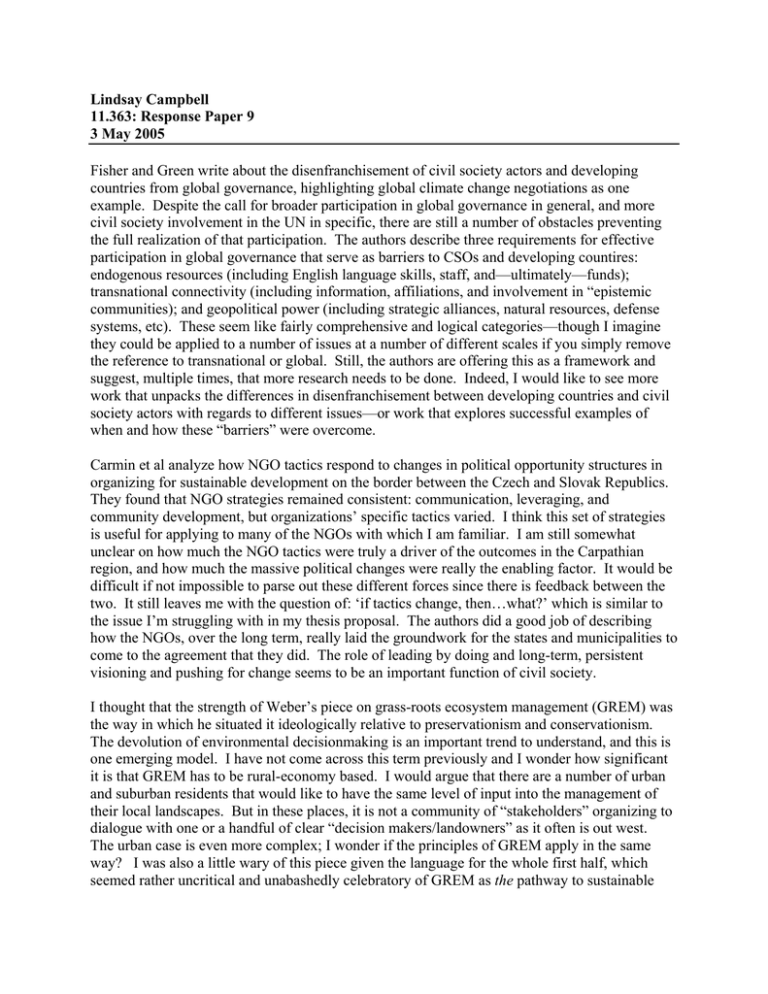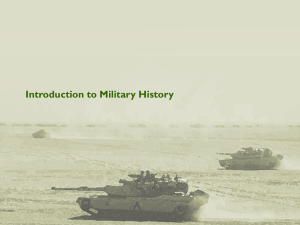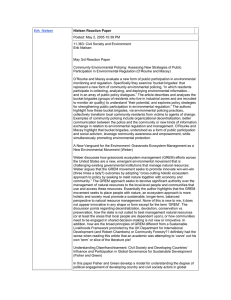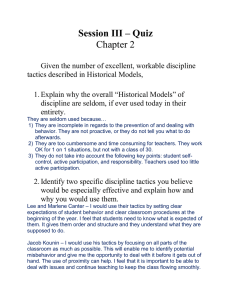Lindsay Campbell 11.363: Response Paper 9 3 May 2005
advertisement

Lindsay Campbell 11.363: Response Paper 9 3 May 2005 Fisher and Green write about the disenfranchisement of civil society actors and developing countries from global governance, highlighting global climate change negotiations as one example. Despite the call for broader participation in global governance in general, and more civil society involvement in the UN in specific, there are still a number of obstacles preventing the full realization of that participation. The authors describe three requirements for effective participation in global governance that serve as barriers to CSOs and developing countires: endogenous resources (including English language skills, staff, and—ultimately—funds); transnational connectivity (including information, affiliations, and involvement in “epistemic communities); and geopolitical power (including strategic alliances, natural resources, defense systems, etc). These seem like fairly comprehensive and logical categories—though I imagine they could be applied to a number of issues at a number of different scales if you simply remove the reference to transnational or global. Still, the authors are offering this as a framework and suggest, multiple times, that more research needs to be done. Indeed, I would like to see more work that unpacks the differences in disenfranchisement between developing countries and civil society actors with regards to different issues—or work that explores successful examples of when and how these “barriers” were overcome. Carmin et al analyze how NGO tactics respond to changes in political opportunity structures in organizing for sustainable development on the border between the Czech and Slovak Republics. They found that NGO strategies remained consistent: communication, leveraging, and community development, but organizations’ specific tactics varied. I think this set of strategies is useful for applying to many of the NGOs with which I am familiar. I am still somewhat unclear on how much the NGO tactics were truly a driver of the outcomes in the Carpathian region, and how much the massive political changes were really the enabling factor. It would be difficult if not impossible to parse out these different forces since there is feedback between the two. It still leaves me with the question of: ‘if tactics change, then…what?’ which is similar to the issue I’m struggling with in my thesis proposal. The authors did a good job of describing how the NGOs, over the long term, really laid the groundwork for the states and municipalities to come to the agreement that they did. The role of leading by doing and long-term, persistent visioning and pushing for change seems to be an important function of civil society. I thought that the strength of Weber’s piece on grass-roots ecosystem management (GREM) was the way in which he situated it ideologically relative to preservationism and conservationism. The devolution of environmental decisionmaking is an important trend to understand, and this is one emerging model. I have not come across this term previously and I wonder how significant it is that GREM has to be rural-economy based. I would argue that there are a number of urban and suburban residents that would like to have the same level of input into the management of their local landscapes. But in these places, it is not a community of “stakeholders” organizing to dialogue with one or a handful of clear “decision makers/landowners” as it often is out west. The urban case is even more complex; I wonder if the principles of GREM apply in the same way? I was also a little wary of this piece given the language for the whole first half, which seemed rather uncritical and unabashedly celebratory of GREM as the pathway to sustainable solutions, the middle road. But, I think this language was somewhat redeemed with the last three pages of conclusion which bring up issues of durability and accountability. What would happen if all environmental decisionmaking were devolved to the micro level? This is a question that I must remind myself of in my own zeal for participation. Coban’s article focuses on local ecological resistance in Turkey as a political project to sustain the community-environment relationship. He stresses the symbiotic relationship between community and environment, and the local effort to save both rather than either/or, given their rural, agricultural lifestyles. This symbiotic relationship came into a clash with a second symbiosis: between state/capital, particularly with the increase in neoliberal policies since the 1980s. Resistance emerged in response to the threat against rural lifestyles in the form of the Bergama gold mine. He describes the variety of tactics used from referenda, to petitions, to lobbying, to direct acts like sit-ins, protests, blockades, tree plantings, and legal challenge against the corporation. Despite a successful legal strategy, government’s lack of implementation led to the need for more direct action. However, support from the very highest levels of government allowed the mining to continue in the face of robust resistance. Finally, the author notes the links that were made to similarly threatened communities as well as global actions via the internet; this was not just a local protest.




